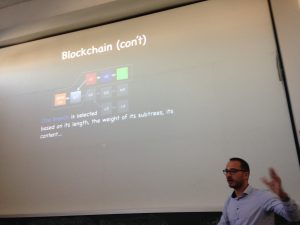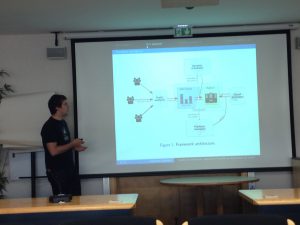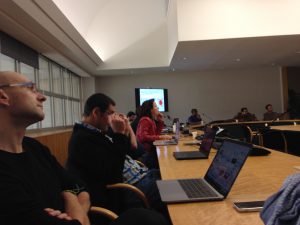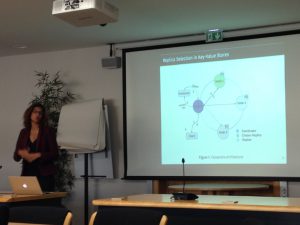Troisième journée du thème Informatique distribuée et calcul haute performance (IDCHP) de la Fédération Informatique de Lyon
Le 13 octobre à 9h30 à L’ENS de Lyon. Salle des conseils de l’ENS. Batiment Monod (2ème étage)
Comment venir: Accès à l’ENS. Site de Monod.
Inscription (gratuite mais fortement souhaitée pour des questions de logistique via le pad communiqué dans la mailing list)
J ournée d’échange axée sur les systèmes distribuées
ournée d’échange axée sur les systèmes distribuées
&
Talk invité ouvert à tous: The Red Belly Blockchain: Consistency and Scalability. Vincent Gramoli (Université de Sydney). (voir détails ci-dessous)
- La deuxième journée sur l’IoT et les capteur aura lieu le 27 novembre (lieu et détails à venir)
- La troisième journée sur les systèmes distribuées le 13 octobre (voir le programme ci-dessous)
Programme:
9h30 – 9h45 Accueil
9h45 – 12h00 Session plénière
Quelques sujets que nous pouvons aborder …
| Autonomic workflow Deployment on dynamic platforms |
Hadrien Croubois (LIP) / Eddy Caron (LIP)
|
| Taming Tail Latency in Key-Value Stores for Heterogeneous Workloads |
Sonia Ben Mokhtar (LIRIS)
|
| Blockchain: an Ephemeral Buzzword or a New Paradigm for Distributed Systems? – What Research Agenda for the Next 5 Years? |
Lionel Brunie (LIRIS)
|
| Achieving Privacy and Utility Trade-off in User Mobility Data |
Sara Bouchenak (LIRIS)
|
12h00 – 13h30 Repas offert par la FIL
14h00 – Exposé ouvert à tous à l’Amphi B – Site de Monod – ENS de Lyon
Titre: The Red Belly Blockchain: Consistency and Scalability
Vincent Gramoli (University Sydney)
 Abstract:
Abstract: To cope with blockchain inconsistencies, like double-spending, developers started building upon Byzantine Fault-Tolerant (BFT) consensus to solve this blockchain problem. At first it seems reasonable because consensus can be effective at totally ordering transactions into a chain.
Unfortunately, these two problems are different. In short, the blockchain problem aims at totally ordering blocks of transactions issued by a large set of potentially misbehaving internet machines, whereas the consensus problem aims at deciding upon one of the values proposed by typically fewer but non-misbehaving machines.
In this talk, I will describe the blockchain consensus problem, a variant of the classic consensus definition, that was recently defined for blockchains. I will present the red belly blockchain, a blockchain that does not use BFT consensus as a black box but rather solves the blockchain consensus problem and illustrate empirically the benefits it offers.
Bio: Vincent Gramoli is the Head of the Concurrent Systems Research Group at the University of Sydney and a Senior Researcher at Data61-CSIRO.
He received his PhD from University of Rennes and his Habilitation from UPMC Sorbonne University. Prior to this, he was affiliated with Cornell University and EPFL. His research interest is in distributed computing.
Participants:
| Ben Mokhtar |
Sonia |
LIRIS |
| Bennani |
Nadia |
LIRIS |
| Bouchenak |
Sara |
LIRIS |
| Brunie |
Lionel |
LIRI |
| Caniou |
Yves |
LIP |
| Caron |
Eddy |
LIP |
| Cazabet |
Rémy |
LIRIS |
| Croubois |
Hadrien |
LIP |
| Furno |
Angelo |
CITI |
| Gramoli |
Vincent |
Sydney University |
| Kotto Kombi |
Roland |
LIRIS |
| Le Mouël |
Frédéric |
CITI |
| Lefevre |
Laurent |
LIP |
| Moyaux |
Thierry |
DISP |
| Médini |
Lionel |
LIRIS |
| Perez |
Christian |
LIP |
| Simonin |
Olivier |
CITI |
| Urbain |
Xavier |
LIRIS |
| Vivien |
Frédéric |
LIP |
| Canon |
Louis-Claude |
LIP |

Pour toutes questions merci de contacter Eddy Caron et/ou Sonia Ben Mokhtar.


 ournée d’échange axée sur les systèmes distribuées
ournée d’échange axée sur les systèmes distribuées Abstract:
Abstract:


